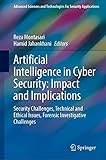Artificial Intelligence in Cyber Security: Impact and Implications [electronic resource] : Security Challenges, Technical and Ethical Issues, Forensic Investigative Challenges /
Material type: TextSeries: Advanced Sciences and Technologies for Security ApplicationsPublisher: Cham : Springer International Publishing : Imprint: Springer, 2021Edition: 1st ed. 2021Description: VI, 306 p. 99 illus., 81 illus. in color. online resourceContent type:
TextSeries: Advanced Sciences and Technologies for Security ApplicationsPublisher: Cham : Springer International Publishing : Imprint: Springer, 2021Edition: 1st ed. 2021Description: VI, 306 p. 99 illus., 81 illus. in color. online resourceContent type: - text
- computer
- online resource
- 9783030880408
- 005.8 23
- QA76.9.A25
1. Artificial Intelligence for Cyber Security: Principles and Paradigms -- 2. Cognitive Technologies and Artificial Intelligence in Cyber Security -- 3. Artificial Intelligence and Machine Learning Tools for Cyber Defence Operations -- 4. Machine Learning against Cyber Terrorism: Detecting Modified Terrorist Content Online -- 5. Combating Cybersecurity Kill Chain: Moving to a Proactive Security Model -- 6. Decoding Encrypted Data Using Deep Neural Networks -- 7. Socio-Technical Security: User Behaviour, Profiling and Modelling and Privacy by Design -- 8. Artificial Intelligence-Enabled Authentication and Associated Security Implications -- 9. Attacking Artificial Intelligence: Security Vulnerability and Proposed Countermeasures -- 10. Intelligent Security: Applying Artificial Intelligence to Detect Advanced Cyber Attacks.
The book provides a valuable reference for cyber security experts, digital forensic practitioners and network security professionals. In recent years, AI has gained substantial attention from researchers in both academia and industry, and as a result AI’s capabilities are constantly increasing at an extraordinary pace. AI is considered to be the Fourth Industrial Revolution or at least the next significant technological change after the evolution in mobile and cloud computing technologies. AI is a vehicle for improving the quality of our lives across every spectrum with a broad range of beneficial applications in various sectors. Notwithstanding its numerous beneficial use, AI simultaneously poses numerous legal, ethical, security and privacy challenges that are compounded by its malicious use by criminals. These challenges pose many risks to both our privacy and security at national, organisational and individual levels. In view of this, this book aims to help address some ofthese challenges focusing on the implication, impact and mitigations of the stated issues. The book provides a comprehensive coverage of not only the technical and ethical issues presented by the use of AI but also the adversarial application of AI and its associated implications. The authors recommend a number of novel approaches to assist in better detecting, thwarting and addressing AI challenges. The book also looks ahead and forecasts what attacks can be carried out in the future through the malicious use of the AI if sufficient defences are not implemented. The research contained in the book fits well into the larger body of work on various aspects of AI and cyber security. It is also aimed at researchers seeking to obtain a more profound knowledge of machine learning and deep learning in the context of cyber security, digital forensics and cybercrime. Furthermore, the book is an exceptional advanced text for Ph.D. and master’s degree programmes in cyber security, digitalforensics, network security, cyber terrorism and computer science. Each chapter contributed to the book is written by an internationally renowned expert who has extensive experience in law enforcement, industry or academia. Furthermore, this book blends advanced research findings with practice-based methods to provide the reader with advanced understanding and relevant skills.


There are no comments on this title.